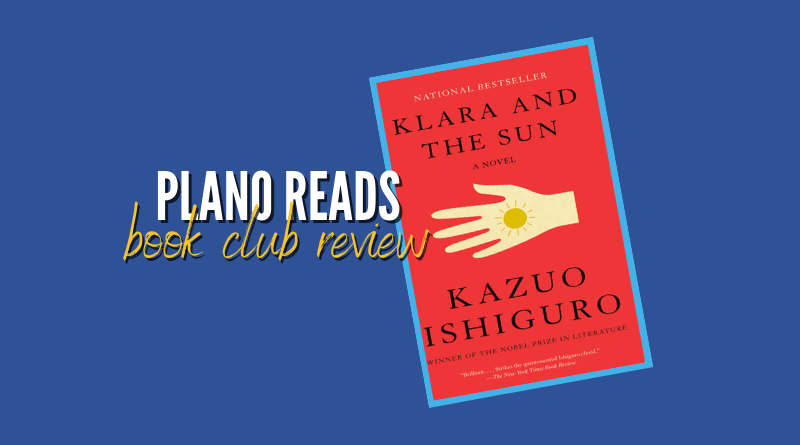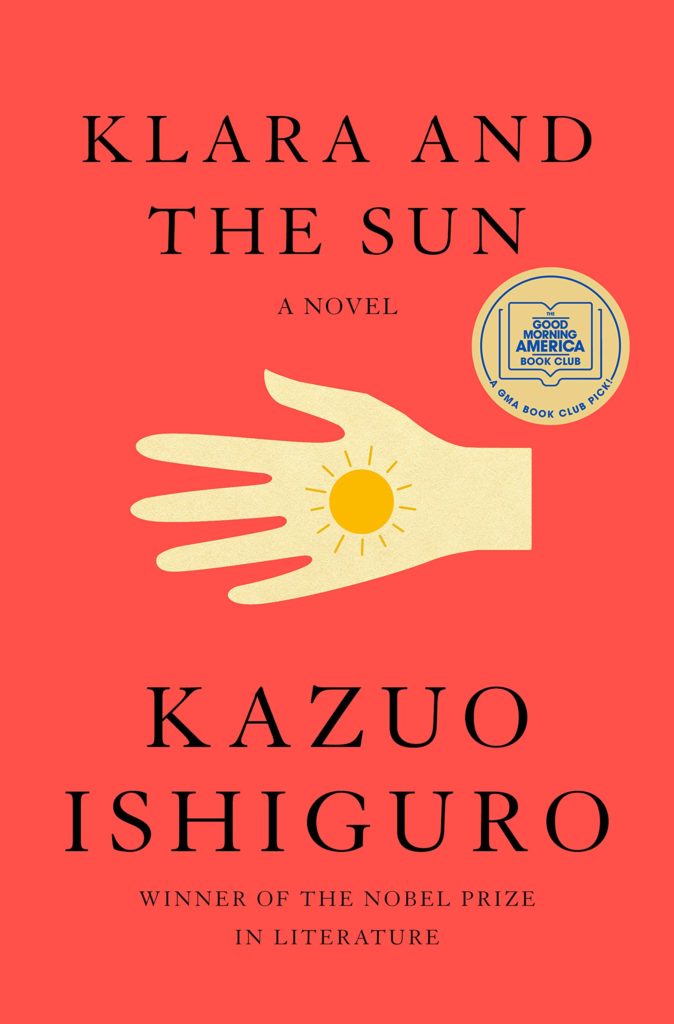
Plano Reads: ‘Klara and the Sun’ Comes to Second Tuesday Book Club on February 14
Second Tuesday Book Club will meet in person from 7 to 8:15 p.m. on Tuesday, February 14, in the program room at Schimelpfenig Library to discuss the newest novel by Nobel Prize winner Kazuo Ishiguro, Klara and the Sun. As usual, we will observe social distancing, but with face coverings optional. Please email Cathe Spencer at cathes@plano.gov if you have questions or comments. See you at Schimelpfenig Library soon!


Klara and the Sun by Kazuo Ishiguro
Available as Print | Chinese | eBook | eAudiobook
‘The heart you speak of,’ I said. ‘It might indeed be the hardest part of Josie to learn. It might be like a house with many rooms. Even so, a devoted AF, given time, could walk through each of those rooms, studying them carefully in turn, until they became like her own home.‘
From her place in the store that sells artificial friends, Klara – an Artificial Friend with outstanding observational qualities – watches carefully the behavior of those who come in to browse, and of those who pass in the street outside. She remains hopeful a customer will soon choose her, but when the possibility emerges that her circumstances may change forever, Klara is warned not to invest too much in the promises of humans. In this luminous tale, Nobel Prize winner Kazuo Ishiguro looks at our rapidly changing modern world through the eyes of an unforgettable narrator to explore a fundamental question: what does it mean to be truly human, and what does it mean to love?

Writing in the New York Times, Radhika Jones comments, “Klara is a man-made marvel. She lacks the fluidity of human mobility such that to negotiate a gravel driveway is a project of careful intention. But like the great outdoors, she runs on solar power, and she ventures deliberately into the natural world at critical points in the story, communing with the sun to try to help Josie with matters bigger than either one can comprehend. Klara’s perception, too, is at once mechanical and deeply subjective. Fields of vision appear in squares and panels, so that you can imagine (through her eyes) pictures processed and bitmapped, resolving themselves the way a high-definition image resolves on a screen, but with a shifting focus that seems tied to her interpretation of the events and environment around her. Seeing the world from Klara’s point of view is to be reminded constantly of what it looks like when mediated through technology. That might have felt foreign a century ago, but not anymore.”
NPR reviewer Maureen Corrigan responds strongly to the novel, noting, [Ishiguro] is the master of slowly deepening our awareness of human failing, fragility and the inevitability of death — all that, even as he deepens our awareness of what temporary magic it is to be alive in the first place. Like a medieval pilgrim walking a cathedral labyrinth in meditation, Ishiguro keeps pacing his way through these big existential themes in his fiction. Klara and the Sun is yet another return pilgrimage and it’s one of the most affecting and profound novels Ishiguro has written. I know that’s something of an old-fashioned conceit, as is the word, “masterpiece”; nevertheless, I’ll go for broke and call Klara and the Sun a masterpiece that will make you think about life, mortality, the saving grace of love: in short, the all of it.”
From Kirkus Reviews comes this: “Much of Ishiguro’s tale is veiled: We’re never quite sure why Josie is so ill, the consequence, it seems, of genetic editing, or why the world has become such a grim place. It’s clear, though, that it’s a future where the rich, as ever, enjoy every privilege and where children are marshaled into forced social interactions where the entertainment is to abuse androids. … Ishiguro delivers a story, very much of a piece with his Never Let Me Go, that is told in hushed tones, one in which Klara’s heart, if she had one, is destined to be broken and artificial humans are revealed to be far better than the real thing. A haunting fable of a lonely, moribund world that is entirely too plausible.”


Sir Kazuo Ishiguro OBE FRSA FRSL is a British novelist, screenwriter, musician, and short-story writer. Ishiguro was born in Nagasaki, Japan, and moved to Britain in 1960 with his parents when he was five. He is one of the most critically acclaimed and praised contemporary fiction authors writing in English, having been awarded the 2017 Nobel Prize in Literature.
His first two novels, A Pale View of Hills and An Artist of the Floating World, were noted for their explorations of Japanese identity and their mournful tone. He thereafter explored other genres, including science fiction and historical fiction. He has been nominated for the Booker Prize four times, winning the prize in 1989 for his novel The Remains of the Day, which was adapted into a film of the same name in 1993. Time named Ishiguro’s science fiction novel Never Let Me Go as the best novel of 2005 and one of the 100 best English-language novels published between 1923 and 2005. He was nominated for the Academy Award for Best Adapted Screenplay for the 2022 film Living.




